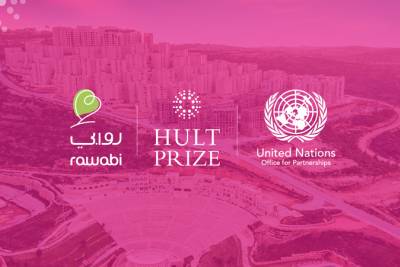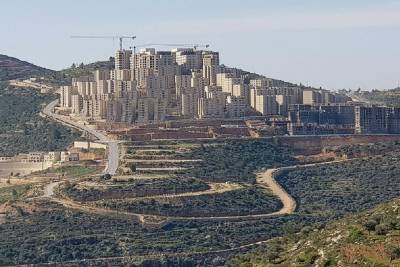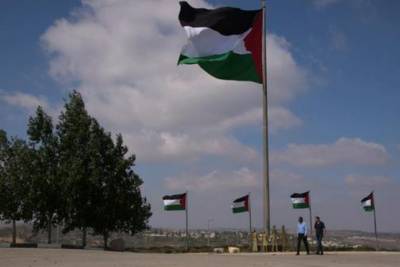Palestine's Silicon Valley
Basler Zeitung - Pierre Heumann - The new city of Rawabi in the West Bank is establishing itself as an innovation center and smashing clichés.

"This is either a ticking time bomb - or a great opportunity." Entrepreneur Bashar Masri in front of the skyline of his city Rawabi.
Bashar Masri believes in Palestine. And he works on it: as manager and investor, as visionary and doer. "We're in state-building mode," says the 56-year-old Palestinian, "the catalyst for our start-up nation thrives here." By "here" he means the city of Rawabi, which was formed under his aegis on the hills of the West Bank is. Here, the Palestinian middle class is to find a new home, a center in which high-tech jobs, modern apartments, entertainment and a shopping center are bundled.
Many speak and dream of the state of Palestine: some by promoting their concerns out in the world, others by terrorizing Israel. Masri, who comes from one of the richest Palestinian families, has decided on a different strategy: he creates facts, wants to realize with his technology cluster, a Palestinian Silicon Valley, where, according to the slogan, "live, work and grow." ,
The era of "Abus" is over, says Masri, thinking of Abu Abbas - the nickname for President Palestine, Abu Amar nom de guerre of Arafat, or terrorists like Abu Jihad or Abu Nidal. Masri wants to give his compatriots a better future and prove that Palestinians can build cities of high quality.
The water is processed locally, schools are created, soon the clinic is ready. In the one-time six districts are to live up to 40 000 Palestinians. Rawabi not only offers the highest home decor and quality of life. There are also jobs. The innovation center is supposed to attract companies like Google, Microsoft, Cisco or Intel. He hopes that Palestine will no longer be known worldwide as a hotspot for resistance, terror, poverty and refugee misery, but above all as an innovation center. In a first step, the city wants to profile itself as a software outsource center for international companies; He sees himself in the same league as Eastern European countries, says Masri.
Great potential for innovation
Masri's ambition: The young people should have a better future. Thousands of Palestinians have built the city, with wages 30 percent higher than the Palestinian minimum wage. As a small sensation, as a novelty in the male-dominated Arab world, it must be said that about a third of architects and engineers are women.
While Masri nibbles on green lettuce leaves, he enthuses about the innovative potential of Palestine. Almost all under-30s have a university degree, speak English and are familiar with the new technologies. Masri takes advantage of this potential and develops a tech hub in Rawabi. That should, he says, raise the morale of all young Palestinians. Because the options are still not used, says Masri: "One in four 20 to 30 year olds is unemployed." And it is getting worse: "Every year, tens of thousands of new university graduates are added. This is either a ticking time bomb - or a great opportunity, "says Masri.
Whining is not his thing. Ten years ago, Masri began implementing the project, which is currently estimated to cost $ 1.4 billion - twice as much as originally planned. The money comes from Masri's Massar company and, most importantly, Qatar's sovereign wealth fund. He has no reason to believe that the current crisis in the Persian Gulf will affect Rawabi, he tells BaZ. Of course, according to Masri, Doha wants to correct the problems with the neighbors first and foremost. He hopes that the situation on the Gulf will soon return to normal,
Masri knows how to solve problems. There were always obstacles to overcome in the construction of the Palestinian city. War in Gaza, Violence in the West Bank: They delayed the construction work. Masri also had to overcome difficulties because of the location. The city of Rawabi is surrounded by territory that controls Israel. Therefore, he had to negotiate with the Israeli authorities about the water supply, the connection to the power grid and road connections. He is building Rawabi to overcome the harsh conditions of the occupation by first building his own city for Palestinians, Masri says, adding that this should be just the beginning.
Masri grew up in the West Bank city of Nablus. He is six years old when Nablus is conquered by Israel during the Six-Day War, ending Jordanian rule. As a teenager he is constantly confronted with Israeli soldiers patrolling Nablus. In his childhood he believed in violence, says Masri. He organized in his high school resistance, planned demonstrations or protested in letters to the then UN Secretary General Kurt Waldheim against the occupation.
Because the young Masri uses violence and throws stones against Israeli soldiers, he has to go to prison, first as a 14-year-old, then again two years later. When the Intifada erupted in 1987, he again actively participated in planning committees at the resistance. After his release from prison, he enrolls in an American college and studies at the Faculty of Chemical Engineering and Management, then works in the US, sets up his own investment firm, Massar International, and marries an American.
For shopping abroad
Early on, he tells us that the Palestinians can not rely on the Arab "brothers", he quotes the word brothers with two fingers in the air in quotation marks. However, he constantly complained as a pitiable sacrifice, but he ruled out as a future model. And so, over the years, his dream of founding a Palestinian city grew. In 1994, when the Israeli-Palestinian coalition provided for optimism, he returned from the United States back to his homeland. But as he begins to build the city, the Second Intifada breaks out. That's why Masri is moving away from Morocco with its investment project.
Rawabi, Arabic for "hill", has become a proud city offering affordable flats in a modern setting at affordable prices. The amphitheater, which can accommodate 20,000 spectators, has already been built, and a clinic is practically ready for occupancy. Also planned are seven cinemas, a hotel, a swimming pool with water slides, a riding school, a safari facility. As a magnet also the shopping center Q-Center - Q stands for the first letter of Qatar, English Qatar - Masri is convinced. International labels like Timberland, North Face, McGregor, Wrangler, Max Mara, Nine West are already here, Mango is also announced.
"We're thrilled to have all those sonic names come to us," says a young, fashion-conscious woman we address in one of these high-end stores. She has previously bought her clothes in Amman or in Istanbul. The last time she left in Turkey for shoes, bags and other fashion items about $ 3,000. Now she will be able to spend the money at home and also save travel expenses.
The skeleton of the mosque is already standing, there will also be a church, the foundation stone has already been laid, accompanied by a small celebration. "We want to be a secular, liberal cosmopolitan city," says Masri. The radicals would not feel comfortable here, says the city planner Ibrahim Natour on the question of whether he is not afraid that Islamists and fanatics could settle here and disrupt the structure.
Criticism of contact with Israel
Initially Rawabi met with skepticism among sections of the population. Especially among the Conservatives his project was viewed critically, as something foreign, as something modern, with which one could not identify. But it was not just about building a western city on Palestinian soil. Masri was also accused of collapsing with the occupying power of Israel.
In order to receive all the permits for the construction of the city, he had to negotiate with Israeli officers, officials and politicians. The "normalize the occupation," accused him of Palestinians, the contacts with Israeli strictly reject. The critics also include representatives of the Palestinian Liberation Front and the government. President Mahmoud Abbas has never seen Rawabi, the economic model of success in Palestine. The Palestinian government does not support the project.
Masri, however, can not be deterred by this. What Rawabi realizes with private money so far and in the future, that is "the new Palestine we have to deal with".
To view original article in German, Click Here.
To view original translated article, Click Here.



